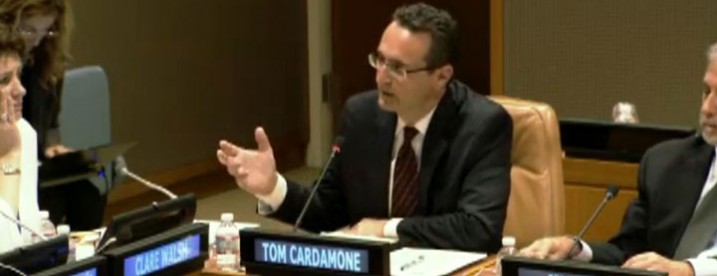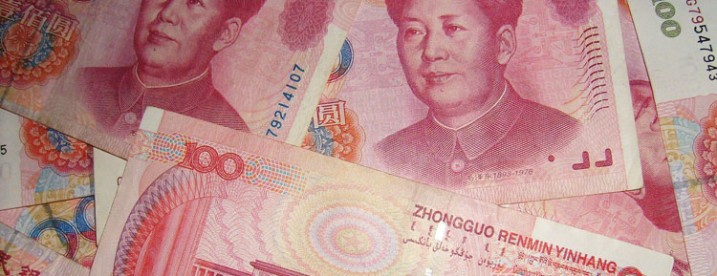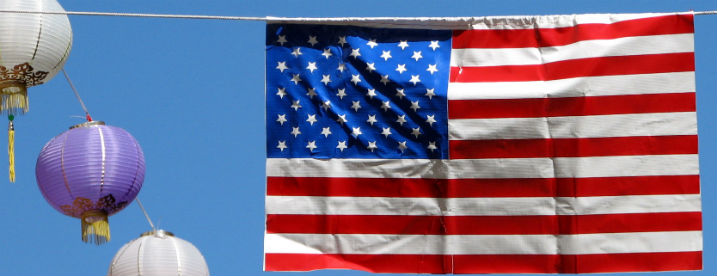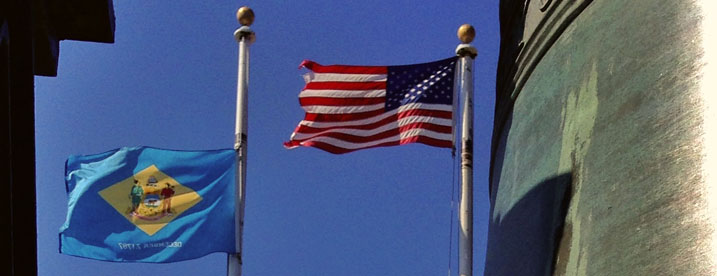By Tom Cardamone, September 29, 2014

GFI Participates in High Level OECD Side-Event on Curbing Illicit Flows during UN General Assembly Meetings
On September 24th, tucked away in a quiet conference room in the basement of the UN General Assembly building, an extraordinary conversation took place on the future of global development. But, despite the gathering of representatives from the OECD, UN, World Bank, USAID and the Mexican, Australian, and Nigerian governments, the event received exactly zero media coverage.
Titled “Curbing Illicit Financial Flows for Domestic Resource Mobilization and Sustainable Development in the Post-2015 Era,” the focal point of the two-hour discussion was how the international community could, as the program description put it, “identify concrete international actions needed” to curtail illicit financial flows out of developing country economies. While other events were given more airtime and other issues may require more immediate attention, some ideas presented at the panel could be transformational in terms of how countries address the scourge of illicit flows and how the development agenda is funded.
By Clark Gascoigne, September 23, 2014

GFI’s Current Methodology Finds Illicit Outflows from China Totaled US$1.08 Trillion from 2002-2011, Not US$2.83 Trillion from 2005-2011
With the anti-corruption drive underway in China, our estimates of illicit financial flows have been in the news a lot lately. This is for good reason; there is a ton of illicit money gushing out of China.
But, if you have been reading multiple stories on this topic, you might be a little confused about the precise scale of the problem facing China.
Prominent outlets such as the Financial Times, the South China Morning Post, and China Daily, among others, have all reported over the past week that:
“The US-based non-profit group Global Financial Integrity estimates illegal flows out of China amounted to $2.83tn between 2005 and 2011.”
While other major sources such as Businessweek and the Heritage Foundation have stated:
“Between 2002 and 2011, $1.08 trillion of illicit funds were spirited out of China, estimates Washington (D.C.)-based nonprofit Global Financial Integrity.”
These estimates are widely different. Some of these outlets must be incorrect in their reporting, right?
By Stefanie Ostfeld, Global Financial Integrity, August 25, 2014

Four Delaware Citizens Publish Letters in The News Journal of Delaware Urging their Congressional Delegation to Curb Anonymous Company Abuse
Our campaign to stop criminals using anonymous companies to cover their tracks is getting traction in some unexpected places.
Last month we wrote about how politicians in Delaware were starting to speak out about their state’s role as a corporate secrecy haven. Half of the state legislators had sent a letter to the Delaware Congressional Delegation, urging them to support bipartisan federal legislation introduced by Senators Levin (MI-D) and Grassley (IA-R) to deal with anonymous companies.
A few weeks ago we were invited to speak about this issue at a community forum organized by the Delaware chapters of Americans for Democratic Action and the National Association of Social Workers. I was on a panel with two Delaware state legislators, the head of a local social justice organization and the Deputy Secretary of State of Delaware.
Now we’re starting to see ordinary citizens from Delaware speak out as well. This week there have been a number of letters to the editor in the Delaware News Journal.
By Grace Zhao, August 22, 2014

U.S. Laws Enable the Outflow of Illicit Money from China, which Totaled US$1.08 Trillion from 2002 to 2011
Corrupt politicians, fugitive officials, and leaders on the lam have found a new safe haven to call home—the United States of America.
Interestingly enough, despite the sometimes contentious relationship between the two countries, the U.S. has now become the destination of choice for China’s “economic fugitives” running from corruption charges in their home country according to China Daily and the International Consortium of Investigative Journalists.
Many of these fugitives are known as “naked officials”, those who have moved their assets and family abroad to avoid regulations and scrutiny. Much of the time, these are high ranking leaders who have decided to move their wealth abroad should a corruption investigation arise.
By Max Heywood, Global Financial Integrity, August 12, 2014

Lionel Messi’s Tax Troubles Should Increase Pressure on Politicians to Curb the Abuse of Anonymous Companies
The ongoing prosecution of football super star Lionel Messi for alleged tax evasion made global headlines last week. Messi and his father Jorge are accused of evading 4.2 million euros (US$5.6m) in tax on sponsorship earnings in court documents submitted by the prosecutor.
The alleged tax evasion scheme was based on using a web of anonymous shell companies registered in tax havens such as Belize and Uruguay, as highlighted by our colleagues at Global Witness. These shell companies were linked to other anonymous companies in what the prosecutor calls “convenience jurisdictions” such as the UK and Switzerland.
By Grace Zhao, July 31, 2014

IFJP Seeks Applicants for its Four-Day Media Training Program on Illicit Finance, Financial Secrecy, and Asset Recovery by August 24th
If you weren’t able to sign up for the Thomson Reuters Foundation’s media training program on illicit finance and tax abuse in Africa, you’re in luck because another opportunity has just opened up!
The Illicit Finance Journalism Programme (IFJP) has launched its fourth training program, Introduction to Illicit Finance, Financial Secrecy, and Asset Recovery Autumn 2014. This is a four-day training workshop that will focus on equipping journalists from the developing world to expose illicit financial practices—from corruption to money laundering to tax evasion—and analyze the impact such illicit financial activity has on an economy and society.
According to the IFJP, the workshop aims to:
bring together journalists from countries where often corruption, tax havens and harmful tax practices stall development and entrench poverty.
To do so, the program will focus on teaching journalists how to access company accounts, how to investigate corruption stories, how to track the international policy agenda, and a number of other foundational steps in understanding the offshore world and illicit financial flows.
By Grace Zhao, July 30, 2014

Joint GFI/MINDS Event, Taking Place September 9th in Rio de Janiero, Will Launch New, In-Depth Research on Brazil’s Illicit Financial Flows
We are pleased to announce the dates of our much anticipated conference in Brazil, Illicit Financial Flows in Brazil: A Hidden Resource for Improving Prosperity and Economic Stability.
Join us on September 9th for a joint conference in Rio de Janeiro hosted by GFI and the Multidisciplinary Institute for Development and Strategies (MINDS).
The conference will focus on illicit financial flows in Brazil. According to our previous research, Brazil has a significant problem with illicit outflows, which totaled roughly US$193 billion from 2002 through 2011, making it the 7th largest exporter of illicit capital globally.
By Mark Hays, Global Financial Integrity, July 25, 2014

Half of Delaware’s State Legislators Urge their Congressional Delegation to Support the Incorporation Transparency and Law Enforcement Assistance Act
Last November, a former special agent for the Treasury Department, John Cassara, wrote an op-ed for The New York Times with the headline “Delaware, Den of Thieves?” Cassara described how the state of Delaware (along with Wyoming and Nevada) has become “nearly synonymous with underground financing, tax evasion and other bad deeds facilitated by anonymous shell companies”. He told of his frustration as a law enforcement officer trying to get information out of Delaware about the real owners and controllers of companies registered in the state.
This week, a debate has started in Delaware about its role as a corporate secrecy haven. One-half of the members of the Delaware State Legislaturehave sent a letter to the Delaware Congressional Delegation, urging them to support bipartisan federal legislation introduced by Senators Levin (MI-D) and Grassley (IA-R) to deal with anonymous companies.
To understand why this is such a big deal, it’s important to understand the extent to which Delaware is a global hub for company formation. More than 1 million companies are incorporated in Delaware, which is more than the actual number of living residents. That number includes 50% of all publicly-traded companies in the U.S. and 64% of the Fortune 500. This is no accident; Delaware law grants attractive tax arrangements and other measures that attract businesses to incorporate there. These measures have paid off – in 2011 alone, Delaware collected roughly $860 million in taxes and fees from these companies – about a quarter of the state’s total budget.








